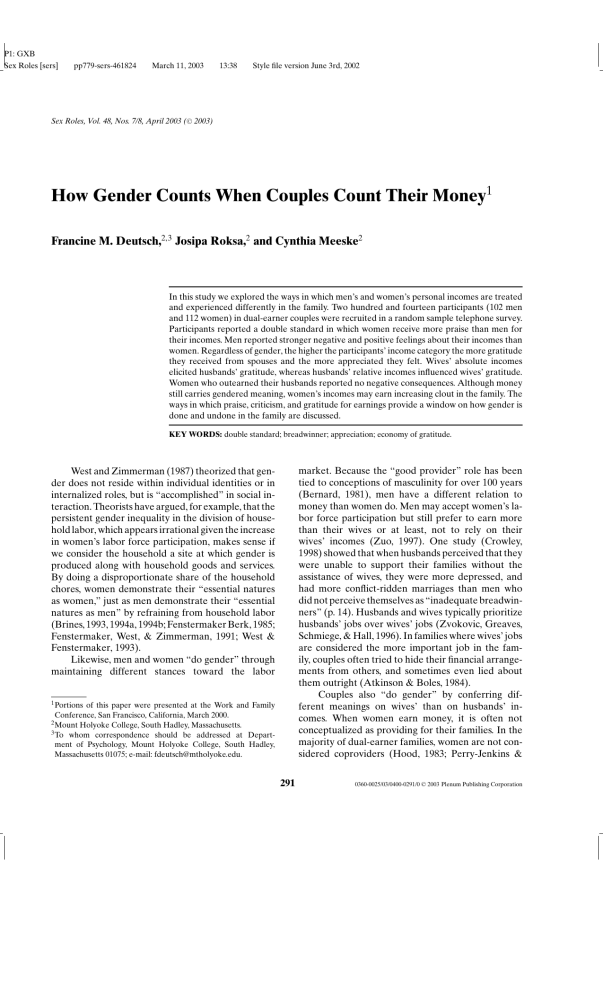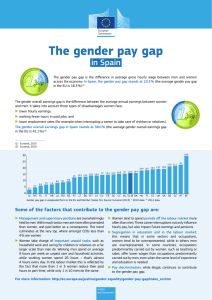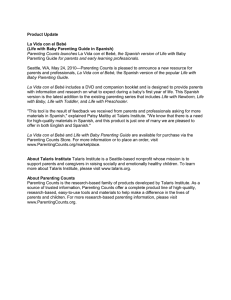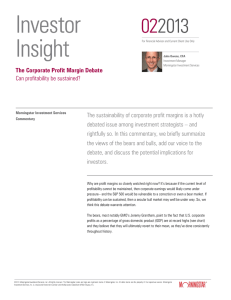
P1: GXB Sex Roles [sers] pp779-sers-461824 March 11, 2003 13:38 Style file version June 3rd, 2002 C 2003) Sex Roles, Vol. 48, Nos. 7/8, April 2003 (° How Gender Counts When Couples Count Their Money1 Francine M. Deutsch,2,3 Josipa Roksa,2 and Cynthia Meeske2 In this study we explored the ways in which men’s and women’s personal incomes are treated and experienced differently in the family. Two hundred and fourteen participants (102 men and 112 women) in dual-earner couples were recruited in a random sample telephone survey. Participants reported a double standard in which women receive more praise than men for their incomes. Men reported stronger negative and positive feelings about their incomes than women. Regardless of gender, the higher the participants’ income category the more gratitude they received from spouses and the more appreciated they felt. Wives’ absolute incomes elicited husbands’ gratitude, whereas husbands’ relative incomes influenced wives’ gratitude. Women who outearned their husbands reported no negative consequences. Although money still carries gendered meaning, women’s incomes may earn increasing clout in the family. The ways in which praise, criticism, and gratitude for earnings provide a window on how gender is done and undone in the family are discussed. KEY WORDS: double standard; breadwinner; appreciation; economy of gratitude. market. Because the “good provider” role has been tied to conceptions of masculinity for over 100 years (Bernard, 1981), men have a different relation to money than women do. Men may accept women’s labor force participation but still prefer to earn more than their wives or at least, not to rely on their wives’ incomes (Zuo, 1997). One study (Crowley, 1998) showed that when husbands perceived that they were unable to support their families without the assistance of wives, they were more depressed, and had more conflict-ridden marriages than men who did not perceive themselves as “inadequate breadwinners” (p. 14). Husbands and wives typically prioritize husbands’ jobs over wives’ jobs (Zvokovic, Greaves, Schmiege, & Hall, 1996). In families where wives’ jobs are considered the more important job in the family, couples often tried to hide their financial arrangements from others, and sometimes even lied about them outright (Atkinson & Boles, 1984). Couples also “do gender” by conferring different meanings on wives’ than on husbands’ incomes. When women earn money, it is often not conceptualized as providing for their families. In the majority of dual-earner families, women are not considered coproviders (Hood, 1983; Perry-Jenkins & West and Zimmerman (1987) theorized that gender does not reside within individual identities or in internalized roles, but is “accomplished” in social interaction. Theorists have argued, for example, that the persistent gender inequality in the division of household labor, which appears irrational given the increase in women’s labor force participation, makes sense if we consider the household a site at which gender is produced along with household goods and services. By doing a disproportionate share of the household chores, women demonstrate their “essential natures as women,” just as men demonstrate their “essential natures as men” by refraining from household labor (Brines, 1993, 1994a, 1994b; Fenstermaker Berk, 1985; Fenstermaker, West, & Zimmerman, 1991; West & Fenstermaker, 1993). Likewise, men and women “do gender” through maintaining different stances toward the labor 1 Portions of this paper were presented at the Work and Family Conference, San Francisco, California, March 2000. 2 Mount Holyoke College, South Hadley, Massachusetts. 3 To whom correspondence should be addressed at Department of Psychology, Mount Holyoke College, South Hadley, Massachusetts 01075; e-mail: [email protected]. 291 C 2003 Plenum Publishing Corporation 0360-0025/03/0400-0291/0 ° P1: GXB Sex Roles [sers] pp779-sers-461824 March 11, 2003 13:38 Style file version June 3rd, 2002 292 Crouter, 1990; Perry-Jenkins, Seery, & Crouter, 1992; Potuchek, 1997). Couples maintain that wives are merely helping rather than assuming responsibility for breadwinning (Hood, 1986). When wives contribute a substantial percentage of family income, couples may deny that wives’ incomes are necessary and, at least in theory, they keep open the option for wives to leave the labor force (Hood, 1983). In working class families, where it’s harder to deny the necessity of wives’ incomes, women may believe they have a responsibility to “help” husbands provide for their families, but usually still consider themselves to be secondary providers (Rosen, 1987; Zavella, 1987). Even when men are unemployed, husbands and wives may deny that the wife is the provider (Zvokovic et al., 1996). One strategy couples often use to downplay the importance of women’s earnings is to earmark them for nonessentials or “extras” (Hood, 1983; Potuchek, 1997; Thompson & Walker, 1989). However, sometimes the so-called “extras” are actually essential. For example, Hood (1986) reported on a couple in which the wife’s income, clearly defined as secondary, “only” went toward mortgage payments. Women’s incomes are also trivialized by the practice of deducting childcare expenses from them before the incomes are counted as contributions to the family (Hertz, 1992). The practice of treating women’s incomes as “special monies” has a long history. Zelizer (1989) reported that in the nineteenth and early twentieth century, when women earned money by extending domestic labor (e.g., taking boarders into their homes) the money was merged with housekeeping money, which rendered it invisible. And when farm wives earned money through the production of butter and eggs, “butter and egg money” was spent differently than the “corn and wheat” money brought in by farm husbands. Money and Power Money confers power in the family. Women who earn relatively more of the family income than other women have more influence in decisions, do a smaller percentage of domestic labor, and have their careers treated as relatively more important (Izraeli, 1994; John & Shelton, 1997; Kamo, 1988; Steil, 1997). Some theorists have gone as far as to suggest that the power difference between men and women in the family is entirely attributable to men’s higher incomes [see Coltrane’s discussion (Coltrane, 1996) of relative resource theory], which implies Deutsch, Roksa, and Meeske that money is gender-neutral. In a more nuanced theoretical position, Blumberg and Coleman (1989) acknowledged the importance of both absolute and relative (to the spouse) earnings in conferring power, but argued that the value of money contributed in the family could be diminished by “discount” factors, such as gender ideology. Gender itself might operate as a discount factor. Women’s incomes do not seem to confer the same advantages in the family that men’s do. For example, women who outearn their husbands are not more likely to say that their careers take precedence in their families, although men who earn more than their wives do say that their careers are more valued (Steil, 1997; Steil & Weltman, 1991). Moreover, women’s dollars don’t buy as much relief from domestic labor as men’s do. When men significantly outearn their wives, those wives do most of the domestic labor in their households, but when women outearn husbands, the most men take on is an equal share of chores (Atkinson & Boles, 1984; Izraeli, 1994; Tichenor, 1999). Some studies even suggest that women compensate for outearning their husbands by taking on more domestic labor (Biernat & Wortman, 1991; Brines, 1993, 1994a, 1994b; Deutsch, Lussier, & Servis, 1993; Hochschild, 1989). Gender also discounts decision-making power in the family. Although outearning wives may have more power in family decisions than other women, they don’t use money-based power with impunity. Regardless of relative earnings, women use persuasion to get their way, whereas husbands sometimes resort to ultimatums and vetoes. Even when an outearning wife seems to shape family decisions, it is not attributed to her superior earnings, but to her planning, organizational, or management skills (Tichenor, 1999). Women are reluctant to emphasize their superior earnings and may go out of their way to communicate that outearning their husbands does not entitle them to special privileges as wives (Atkinson & Boles, 1984; Tichenor, 1999). Thus, although men and women both see money as a symbol of power, prestige, and success, it is a more direct, undisguised source of power for men than for women (Prince, 1993). Men’s use of monetary power along with women’s inability to use monetary power or their restraint in its use, produce and reproduce gender. Praise and Criticism A double standard of praise and criticism for men’s and women’s family roles has been documented P1: GXB Sex Roles [sers] pp779-sers-461824 March 11, 2003 13:38 Style file version June 3rd, 2002 How Gender Counts previously. Women and men who deviate from gendered norms are both praised and criticized by people outside the family more than women and men who adhere to those norms (Deutsch, 1999; Deutsch & Saxon, 1998). Fathers are more likely than mothers to be criticized if they pass up a night out with their friends to spend time with their children or if they leave work to tend to a sick child. Mothers are more likely than fathers to be criticized if they are employed full time or if their children are in day care. Fathers are also praised much more than mothers for taking care of their children. As one father put it: “I change one diaper, I’m a hero—man of the 90’s,” (Deutsch, 1999, p. 94). These different responses to the behavior of men and women reflect that stereotypes can result in the “shifting standards” identified by Biernat and her colleagues (Biernat, Vescio, & Manis, 1998). In a series of studies, they demonstrated that when the performance of the target’s group was expected to be inferior, lower standards for evaluation were applied (Biernat & Kobrynowicz, 1999). For example, women were rated financially successful at a lower income than were men (Biernat, Manis, & Nelson, 1991), Black men were evaluated more positively than White men in a simulated job interview if the two groups had the same leadership qualifications (Biernat & Kobrynowicz, 1997), and fathers who described themselves as “good fathers” were assumed to perform fewer positive parenting behaviors than mothers who described themselves as “good mothers” (Kobrynowicz & Biernat, 1997). Shifting standards can explain the double standard of both praise and criticism for mothers and fathers, but whether evaluators praise or criticize depends on their opinion about whether the deviation from the stereotype is good or bad. Praise and criticism provide a mechanism for making normative gendered expectations salient. The gender construction model argues that we “do gender” by managing our conduct in light of these normative expectations (West & Zimmerman, 1987). When men and women contest gender, onlookers notice and express either approval or disapproval, which highlights that the behavior is nonnormative. However, there is one puzzling exception to the pattern that contesting gender elicits praise or criticism. Neither men nor women report praise for earning money. If men earn excessive praise for occasionally pushing a baby in a stroller, why don’t women merit the same kind of praise for their earnings? We know that women are considered more financially successful than men if they earn the same amount of 293 money (Biernat et al., 1991). In the 150 dual-earner couples the first author interviewed for a recent study, 33 women earned as much or more than their husbands, yet none of them reported praise for their earnings(Deutsch, 1999). None of their husbands reported being told how lucky they were to have wives who contributed so much to the family income, whereas women were routinely told how lucky they were to have husbands who did a lot of childcare. Because succeeding as a man means providing well for his family, drawing attention to a wife’s income may be tantamount to questioning her husband’s masculinity. Praise for women’s earnings may simply be taboo (Deutsch, 1999; Deutsch & Saxon, 1998). The Economy of Gratitude Arlie Hochschild (1989) coined the term “economy of gratitude” to describe the value of exchanged “gifts” between husbands and wives. Husbands and wives exchange gratitude based on their own stances toward gendered norms and how their spouses’ behavior shapes up according to those norms. Thus, we would expect that husbands and wives who endorse traditional norms would tend to be grateful to their spouses for “traditional” behavior (i.e., childcare by women, breadwinning by men), whereas nontraditional husbands and wives would be more grateful to spouses whose behavior contests those norms (i.e., childcare by men, breadwinning by women). However, among couples who agree in their opinions of gendered norms, we would expect more gratitude expressed when spouses contest rather than conform to norms because the nontraditional behavior is not taken-for-granted the way normative behavior would be. The patterns of gratitude that emerge among couples reflect not only gendered norms, but changing responses to those norms, and ultimately, changes in the norms themselves. For example, if overall, wives are more grateful for husbands’ contributions to childcare than husbands are for wives’ contributions, it suggests both that childcare is nonnormative for men and that at least some women want to contest that gendered norm. In contrast, if husbands are ungrateful for wives’ incomes, it suggests that gendered norms for breadwinning are less contested than those for childcare. If, however, husbands are more grateful for their wives’ incomes than wives are for their husbands’ incomes, it suggests that although breadwinning is still nonnormative for women, gendered norms for breadwinning may be changing. P1: GXB Sex Roles [sers] pp779-sers-461824 March 11, 2003 13:38 Style file version June 3rd, 2002 294 Changing Gendered Norms In a longitudinal study of attitudes toward family and work, Willinger (1993) compared attitudes of male college seniors in 1980, 1985, and 1990. Over that decade fewer and fewer men reported feeling uncomfortable with a wife who outearned them. By 1990, 59% of the men surveyed reported that it wouldn’t bother them at all if their wives earned more money, and only 7% reported that they would feel very uncomfortable. Likewise, men professed more support for wives’ career advancement by 1990, even when it meant a geographical move. In the late 1980s, Potuchek (1997) interviewed couples about the meaning of their earnings in the family, and found that only 16% of the women and 36% of the men she interviewed considered themselves and their spouses fully coproviders. When the same couples were interviewed again 5 years later in the early 1990s, 28% of the women and 40% of the men considered themselves coproviders. Likewise, in Perry-Jenkins’s research on provider-role attitudes, a sizeable minority in her sample of 43 couples thought that they had equal responsibility for supporting the family financially (Perry-Jenkins & Crouter, 1990; Perry-Jenkins, Seery, & Crouter, 1992). Even in Atkinson and Boles’s earlier study (Atkinson & Boles, 1984) of “status-reversed” couples, husbands acknowledged benefits they accrued through their wives’ earnings, such as the freedom to pursue other interests without the pressure of providing for the family. Some of the men reported pride in their wives’ career success. As we enter the twenty-first century, the sheer force of women’s increasing contributions to family income should debunk the myth that women’s earnings are peripheral to families’ economic well-being. The percentage of women who outearn their husbands is rising (Winkler, 1998). In 1981, only 15.9% of married women in dual-earner households outearned their husbands, but by 2000, that figure had risen to 22.5% (U.S. Census Bureau, 2001). Zuo (1997) showed that the greater the percentage of family income earned by their wives, the more men’s gender attitudes (including attitudes about providing for the family) changed toward egalitarianism over time. The Current Study In the current study we further explored how gender counts when people count their money. We Deutsch, Roksa, and Meeske examined both gratitude exchanged between husbands and wives inside the family, as well as the praise and criticism received for earnings from both inside and outside the family. We hypothesized that if attitudes toward wives’ earnings are changing, husbands would be more grateful for wives’ incomes than wives are for husbands’ incomes, and women should receive more praise and criticism for their incomes from outside the family than men do. METHOD Participants A total of 214 people (102 men and 112 women) participated in the study. Only individuals in dualearner couples with children living at home were eligible to participate. Both the participant and his/her spouse had to be working at least 20 hr per week in paid labor. The mean age for both men and women was 40 years; the range was 27–65 years old. The mean number of children was 2.11. Men reported contributing a mean of 39.44% of the parenting in their families; women reported a mean of 65.50%, t(211) = 13.32, p < .001. We did not ask the participants’ race so the racial composition of the sample is unknown. On the basis of 2000 census data, each of the four towns surveyed has a population that is at least 94% White (Pioneer Valley Planning Commission, 2000). Fifty percent of the women and 58% of the men had at least graduated from college. On the basis of the 120 people who answered the question “How much do you earn per year?” the median income reported by women was $26,000 (range was $5,000–$100,000); the median for men was $44,000 (the range was $10,000–$100,000), which was significantly different, χ 2 (1) = 20.85, p < .001. All the participants answered a more general question about their income categories, in which they indicated whether they earned less than $15,000, between $15,000 and $25,000, between $25,000 and $50,000, or more than $50,000. For both men and women, the modal category was 25–50 thousand dollars. About half of the incomes fell into that category. Most of the rest of the men in the sample earned more than $50,000, whereas most of the rest of the women earned less than $25,000. On the basis of this income category data as well, men earned more than women, χ 2 (3) = 43.45, p < .001. Twelve undergraduate female interviewers, who were all participating in research courses, contacted P1: GXB Sex Roles [sers] pp779-sers-461824 March 11, 2003 13:38 Style file version June 3rd, 2002 How Gender Counts a total of 3,721 households in a random sample telephone survey of four communities in Western Massachusetts (all within a no cost dialing zone). Initially, we used random digit dialing, but because of the high number of nonresidential calls and phones out of order, we switched to random selection of pages of the relevant telephone books. We alternated asking husbands and wives in different families to participate. About 40% of the families contacted were not eligible and another one-third of the total sample could not be reached.4 Of the remaining 957 families, who were both eligible and reached, 743 refused to participate and 214 agreed, yielding a response rate of 22%. However, some of those who refused to participate were probably not eligible anyway, which deflated the response rate. Procedure In the fall of 1998 and the spring of 1999 participants were contacted by telephone and asked if they would be willing to participate in a study of life in dualearner families. After they agreed and we established their eligibility, they completed a 15-min telephone interview. The data collected for this study were part of a larger study on double standards for men and women in dual-earner couples, thus the interview also included questions on leisure that will not be discussed here. The questions relevant to the current study focused on earned income and parenting. Questions assessed the participants’ earnings and their spouses’ earnings. Because we thought that people might be reluctant to reveal precise income information, they were first asked “How much do you earn per year?” and then, if unwilling to answer, were asked to classify themselves for “categorization” purposes into one of four income categories, which ranged from under $14,999 to over $50,000.5 They also indicated whether their spouses made more, less, or the same income. We asked whether they had ever received praise or criticism from either their spouse or anyone else for their financial contributions to the family, as well as how much their spouses appreciated their financial contributions and how grateful they felt to their spouses for the spouses’ financial contributions. 4 Interviewers made five attempts to reach a number before cate- gorizing it as “no answer.” 5 Unwillingness to answer the precise question “How much do you earn per year?” did not differ between men and women or across income categories. 295 The latter two questions were answered on 7-point scales, which ranged from 1 (not at all) to 7 (very). Participants also rated how happy, frustrated, embarrassed, and proud they felt about their financial contributions to the family on the same 7-point scales. Participants estimated the percentage of parenting that they contributed overall and the percentage that their spouses contributed. They indicated whether or not they had done each of the following four childcare tasks within the past 24 hr: get up at night with children, supervise children’s morning routine, transport children, supervise children’s bedtime routine. We asked if participants had received praise or criticism about their parenting from anyone. If so, we asked whether praise or criticism had come from the spouse and/or someone outside the couple. Finally, participants answered demographic questions. They indicated their genders; their ages and spouses’ ages; levels of education completed by self and spouse; occupations; number of hours in paid work per week; and number, age, and genders of children. RESULTS Praise and Criticism for Earning To assess whether a double standard of praise and criticism existed for income earned, we conducted chisquare analyses that compared men’s and women’s reports of whether they received any praise for their earnings, any praise specifically from the spouse, any praise from other people, any criticism for earnings, any criticism specifically from spouse, and any criticism from others. Figure 1 shows that women reported receiving more praise on each of the praise variables. Overall, 58.2% of the women but only 32% of the men reported any praise for their earnings in the family, χ 2 (1) = 14.23, p < .001. Fifty-four percent of the women but only 30 percent of the men reported praise from spouses, χ 2 (1) = 12.60, p < .001. Twenty-eight percent of the women but only 14 percent of the men reported praise from people outside their immediate family, χ 2 (1) = 6.43, p < .05. These findings are particularly remarkable given that the men in the sample earned significantly more money than the women. Criticism for earning was relatively rare. Only 15 participants (6%) reported criticism from any source. Six men and nine women received criticism. None of the chi-squares on gender differences in criticism reported were significant. P1: GXB Sex Roles [sers] pp779-sers-461824 March 11, 2003 13:38 Style file version June 3rd, 2002 296 Deutsch, Roksa, and Meeske Fig. 1. Percentage of men and women reporting praise for earnings. Next, we examined the relation between income category and reported praise.6 For men, there was no relation between income category and any praise variable. For women, income category was significantly related to reported praise overall, χ 2 (3) = 8.79, p < .05, and praise from outside the family, χ 2 (3) = 9.36, p < .05, and marginally significantly related to praise from the spouse, χ 2 (3) = 6.86, p < .10. The clearest pattern was that women in the lowest income group, those who earned less than $15,000 per year, were less likely than other women to report praise for their financial contributions. For example, only 29% of the women who earned less than $15,000 reported any praise, whereas of the women in the other three income groups, 72%, 65%, and 64%, respectively, reported praise from some source. Because of the very small number of participants who reported any criticism, no analyses were conducted to compare criticism received by income category. 6 We used the income category variable rather than the continu- ous measure of income in many analyses reported in this paper because only 120 of the 214 participants answered the question “How much money do you earn per year?,” whereas all of the participants were willing to classify themselves into an income category. Nonetheless, a parallel set of analyses were carried out using the continuous income variable. In no case did the findings contradict the results using the income category variable. Appreciation and Gratitude for Earnings We then conducted separate analyses of variance to assess how participant income category, spouse income category, and gender affected appreciation and gratitude for earnings between husbands and wives. Because only one male participant fell into the lowest earning category, the lower two categories were collapsed into one. Thus, the three remaining income categories included under $25,000, between $25,000 and $50,000, and over $50,000. A 2 (gender of participant) × 3 (participant’s income category) analysis of variance on how much appreciation participants reported from their spouses revealed a significant main effect of gender, F(1, 194) = 9.85, p < .01, a significant main effect for participant’s income category, F(2, 194) = 9.42, p < .001, and a marginally significant interaction between gender and participant’s income category, F(2, 194) = 2.64, p < .08. Wives felt more appreciated for their earnings (M = 6.11) than husbands did (M = 5.85). Participants who earned over $50,000 per year felt more appreciated (M = 6.29) than those who earned between $25,000 and $50,000 (M = 6.08), who, in turn, felt more appreciated than those who earned under $25,000 (M = 5.44). Although the pattern of less appreciation for lower earnings held for both men and women, it was more pronounced for the men. Moreover, the lower the income category, the greater the gender difference. At the highest P1: GXB Sex Roles [sers] pp779-sers-461824 March 11, 2003 13:38 Style file version June 3rd, 2002 How Gender Counts income level, the mean appreciation felt by men and women was similar (6.22 and 6.50, respectively). At the lowest income level, men’s mean rating of spouses’ appreciation was 3.60, whereas women’s mean rating was 5.65. Next, we conducted a 2 (gender) × 3 (spouse income category) between-groups analysis of variance on participants’ feelings of gratitude toward their spouses for the spouses’ earnings. The analysis revealed only one significant effect: a main effect for spouse income category, F(2, 194) = 8.54, p < .001. Regardless of gender, the more money spouses earned, the more grateful participants felt for their incomes. The means for the three ascending income categories were 6.22, 6.61, and 6.69, respectively. Two additional analyses of variance were conducted, in which we substituted spouse income for participant income in the previous analyses and vice versa. These analyses showed that spouse income was not significantly associated with how appreciated participants felt by spouses, nor was participant income significantly related to how grateful participants felt. Thus, feeling appreciated by a spouse for one’s earnings is associated with how much money one makes, whereas feeling grateful to a spouse depends on how much money the spouse earns. Participants’ Feelings About Their Incomes Separate 2 (gender) × 3 (participant income category) analyses of variance were conducted on the extent to which participants felt happy, frustrated, embarrassed, and proud about their incomes. There were significant main effects for both gender and earning category for each measure. Men expressed stronger feelings than women on both the positive and negative measures. They were happier (Ms = 6.01 and 5.87, respectively), F(1, 191) = 3.91, p < .05, more frustrated (Ms = 2.61 and 2.53, respectively), F(1, 191) = 5.22, p < .05, more embarrassed (Ms = 1.54 and 1.35, respectively), F(1, 191) = 7.32, p < .01, and prouder (Ms = 1.54 and 1.35, respectively), F(1, 191) = 4.72, p < .11, of their incomes than women were. Figure 2 illustrates that regardless of gender, high earners were happier, F(2, 191) = 18.25, p < .001, and prouder, F(2, 191) = 11.97, p < .001, than low earners, whereas low earners were more frustrated, F(2, 191) = 10.70, p < .001, and embarrassed, F(2, 191) = 6.25, p < .01, than high earners. 297 In analyses of covariance, we also examined gender differences on happiness, frustration, embarrassment, and pride while controlling for actual income (rather than income category). When income was controlled this way, the only significant gender difference that remained was in embarrassment, F(1, 117) = 3.9, p < .05. Men were more embarrassed by their incomes than women were (Adjusted Ms 1.64 and 1.34, respectively). Relative Income No evidence suggests that spouses or others are disapproving when wives earn high incomes. In fact, in the three highest income groups about 2/3 of the women report praise from someone. However, it is possible that wives’ high incomes are seen as problematic only when they exceed husbands’ incomes. To test this possibility, we compared men and women who outearned their spouses on the three praise variables. In each case women were more likely to report praise when they outearned their husbands than husbands were when they outearned their wives, but none of the chi-squares were significant. Chi-squares also showed that women who outearned their husbands were not significantly more likely to report criticism for earnings than were men who outearned their wives. The original relative income variable was based on the participants’ reports of whether they earned more, the same, or less than their spouses. However, we discovered that the answer to that question was gendered. The “earns the same” category was particularly problematic because on average, men who reported that they earned the same as their wives, actually earned $7,550 less than their wives, whereas women who reported equal incomes actually earned only $2,208 less than their husbands. Men may avoid the self-perception that they are outearned by their wives by claiming equality more readily than women do with the same income differential. Thus, for further analyses of the effects of relative income, we created a new variable: the percentage of family income earned by the participant. This variable was calculated from participants’ reports of their own incomes and their spouses’ incomes. As mentioned earlier, only 120 of the 214 participants provided this precise income information. Thus, the findings should be treated with caution. Table I shows Pearson correlation coefficients that were calculated separately for male and female P1: GXB Sex Roles [sers] pp779-sers-461824 March 11, 2003 13:38 Style file version June 3rd, 2002 298 Deutsch, Roksa, and Meeske Fig. 2. Mean participant ratings of feelings about earnings as a function of income level. participants between participant’s earnings, percentage of family income earned, spouse’s earnings, and feeling appreciated by spouse for earnings; feeling grateful to spouse for spouse income, and happiness, frustration, embarrassment, and pride with their own earnings. Interesting differences in the pattern of correlations emerged. For women, percentage of family income earned was negatively correlated with gratitude toward spouse, r = −.39, p < .01, but was not significantly correlated with feeling appreciated or with any of the feelings about their own incomes (i.e., happiness, frustration, pride, embarrassment). For men, percentage of family income earned was positively correlated with feeling appreciated, r = .35, p < .01, but not significantly correlated with gratitude or with any of the feelings about income variables. However, for both women and men, the more appreciated they felt by their spouses for their earnings, the happier (r = .58, p < .01, r = .41, p < .01, respectively), less embarrassed (r = −.30, p < .01, r = −.28, p < .01, respectively), and prouder (r = .63, p < .01, r = .59, p < .01, respectively) they felt about those earnings. Women also felt less frustrated by their earnings the more appreciated they were by their husbands, r = −.34, p < .01. Thus, the greater the percentage of the family income husbands earn, the more husbands feel appreciated and the more wives feel grateful. In contrast, when women’s share of the family income increases, men do not feel more grateful than other men nor do women feel more appreciated for their incomes than other women do. Because actual income and relative income are highly correlated, it is not entirely possible to disentangle the independent effects of each, but some of the patterns are suggestive. For example, although women’s gratitude for their husbands’ incomes is significantly correlated with the percentage of family income that husbands earn, r = .39, p < .01, it is not significantly correlated with husbands’ Feelings about parenting .12 −.49∗∗ .02 −.72∗∗ .16 .09 −.02 .24 .35∗∗ −.24 299 .32∗ .15 .12 .58∗∗ .20∗ .51∗∗ .41∗∗ .30∗∗ .44∗∗ −.26∗ −.39∗∗ .13 .38∗∗ .22 .03 −.04 −.17 .28∗ −.30∗∗ −.13 −.39∗∗ −.13 .01 −.07 −.28∗∗ −.16 −.36∗∗ −.24 −.09 −.09 .63∗∗ .28∗∗ .68∗∗ −.31∗∗ .25 .21 −.05 .59∗∗ .47∗∗ .60∗∗ −.41∗∗ .28∗ .24 −.05 −.34∗∗ −.05 −.51∗∗ .32∗∗ −.37∗∗ −.30∗ −.22 −.10 .05 −.02 −.25∗ .47∗∗ −.04 −.33∗ −.05 −.21 −.34∗∗ −.12 −.16 .10 −.15 .04 −.33∗∗ −.24 .01 −.05 .34∗∗ −.11 −.01 .02 .18 −.37∗∗ −.46∗∗ .28∗ .52∗∗ .40∗∗ .38∗∗ −.29∗∗ .33∗∗ −.20∗ −.12 .06 −.19 .23 .39∗∗ .36∗∗ .16 −.22∗ .29∗∗ .05 .27∗∗ .08 −.07 .18 .50∗∗ .61∗∗ .44∗∗ .34∗∗ −.29∗∗ .38∗∗ −.22∗ −.46∗∗ .16 −.00 .22 .30∗∗ .35∗∗ .12 .07 −.25∗ .05 −.06 −.19 .18 .11 .08 13:38 .71∗∗ .57∗∗ March 11, 2003 ∗ p < .05. ∗∗ p < .01. Husbands Earnings ($) Earnings (%) Spouse’s earnings ($) Feelings about earnings Appreciated Grateful to spouse Happy Embarrassed Proud Frustrated Parenting (%) Feelings about parenting Appreciated Wives Earnings ($) Earnings (%) Spouse’s earnings ($) Feelings about earnings Appreciated Grateful to spouse Happy Embarrassed Proud Frustrated Parenting (%) Feelings about parenting Appreciated Feelings about earnings pp779-sers-461824 Earnings (%) Spouse’s earnings ($) Appreciated Grateful to spouse Happy Embarrassed Proud Frustrated Parenting (%) Appreciated Grateful to spouse Sex Roles [sers] Table I. Correlation Coefficients for Earnings and Parenting P1: GXB Style file version June 3rd, 2002 P1: GXB Sex Roles [sers] pp779-sers-461824 March 11, 2003 13:38 Style file version June 3rd, 2002 300 actual income (r = .13).7 In contrast, men’s gratitude for their wives’ incomes is significantly correlated with wives’ actual incomes, r = .28, p < .05, but not with the percentage of family income that wives earn, r = .17.8 Taken together, these findings suggest that men’s and women’s incomes are not treated in exactly the same way. Men’s incomes are appreciated more as a function of their relative than their actual contribution probably because a greater relative contribution reflects the provider role. Men are appreciated not so much for earning money, as for being providers. Women’s incomes are appreciated for what they add to the family fortunes, but not when their increasing share of the family income threatens to turn them into providers. Nonetheless, these findings do not necessarily imply that women are penalized for outearning their husbands. When we compared men and women who earned more than 50% of the income in their families, outearning women tended to feel more appreciated than did outearning men (M = 6.56 vs. M = 6.05), t(44) = 1.70, p < .11, and they did not feel less happy, more frustrated, more embarrassed, or less proud than their male counterparts.9 7 Because women’s work hours are significantly correlated to the percentage of family income earned, r = .37, p < .01, we thought that women might be grateful to their husbands because they didn’t work as much rather than because of husbands’ greater earnings. However, even after we controlled for women’s work hours, their gratitude for husbands’ incomes was significantly correlated to the percentage of family income earned by those husbands, r = .39, p < .01. Moreover, women’s work hours were not at all correlated with gratitude to husbands for their earnings, r = −.04. 8 To illustrate that the pattern of correlations differs for men and women, we ran two regressions: the first in which gratitude for spouse’s income was regressed on actual income, sex, and the interaction term for the two, the second in which gratitude for spouse’s income was regressed on relative income, sex, and the interaction term for those two. In the first equation, the t value for the interaction term is –1.34, whereas in the second, the t value for the interaction term is 1.16. The different signs for the t values of the interaction term in the two equations show that gratitude is associated differently with actual and relative income, depending on the gender of the participant. 9 This finding is based on the 46 participants (37 men and 9 women) who reported income information for both themselves and the spouses whom they outearned. When we compared participants based on their self-reports of relative earning, which included 89 participants (71 men and 18 women) who said they outearned their spouses, the results were consistent. Women who outearned their husbands felt more appreciated by them (M = 6.78) than did men who outearned their wives (M = 6.14), t(87) = 2.25, p < .001. Deutsch, Roksa, and Meeske Parenting Chi-squares were calculated to compare the praise and criticism reported by men and women, and they showed that men were no more likely than their wives to receive praise or criticism for parenting, either from spouses or from people outside their immediate family.10 Unlike previous research, we did not observe a double standard of praise that favored fathers. In fact, t-tests calculated to compare men and women showed that women felt more appreciated (M = 6.29) than men (M = 5.72) for their parenting, t(212) = 3.54, p < .001. Likewise, men felt more grateful (M = 6.47) for their wives’ parenting than women felt for their husbands’ (M = 5.91), t(212) = 3.61, p < .001. We can’t conclude, however, that a double standard that favors women is operating. Women may earn more gratitude and feel more appreciated, not simply because they are women, but because they contribute more parenting than men do. In fact, when spouses’ percentage of parenting was controlled (as a covariate), the gender difference in gratitude felt for parenting disappeared. Men usually feel more grateful to their wives than wives do to their husbands, because men have more to be grateful for when it comes to parenting. Paradoxically, however, we found that even when we controlled for percentage of parenting (as a covariate), although we know the actual gratitude felt by spouses was the same, women felt more appreciated than men did for their parenting, F(1, 210) = 3.88, p < .05. To explore further possible gender differences in spouses’ exchange of gratitude for parenting, we examined the relation between the percentage of parenting contributed by men and women and how much they felt appreciated by and grateful to spouses (see Table I). Women were more grateful to husbands who contributed a greater percentage of parenting, r = .46, p < .01, and as husbands did relatively more, they themselves felt more appreciated as parents, r = .27, p < .01. In contrast, when women contributed relatively more of the parenting, men were not significantly more grateful, r = .19, p > .10, nor did those women feel more appreciated for their parenting, r = −.12, p > .10. 10 Even when we compared only the men and women who claimed to share childcare equally, there was no difference in the praise they reported for their parenting. P1: GXB Sex Roles [sers] pp779-sers-461824 March 11, 2003 13:38 Style file version June 3rd, 2002 How Gender Counts The Relation Between Parenting and Earning Husbands and wives contributed to the family by both paid labor and domestic labor. Consistent with other findings, the more money earned by both men and women, the lower their percentage contributions to parenting (r = −.37 and r = −.33, respectively, ps < .01), even when work hours were controlled. Likewise, the higher the relative income of participants, the lower their percentage contributions to parenting, although the relation was significant for men, r = −.46, p < .001, but not for women, r = −.24, p > .05. Because parenting and income earned appear to trade off as contributions, one might think that gratitude for a spouse’s income mediates the relationship between income earned and parenting. That is, a participant who earns relatively less than a spouse might express gratitude by doing relatively more parenting. However, our analyses did not bear this out. Gratitude for the spouse’s income was related to the percentage of men’s parenting, r = .34, p < .01, but not to the percentage of women’s parenting, r = −.13, p > .05. When we controlled for gratitude for spouse’s income in partial correlations, relative income was still negatively correlated with percentage of parenting for both men, r = −.43, p < .001, and for women, r = −.29, p < .05. DISCUSSION Gender certainly still counts when people count their money. First, men and women feel differently about the money they earn. Second, women are praised more than men for earning money, although on average they earn less money than men do. Third, women feel more appreciation from husbands for earning income than husbands feel from wives. Fourth, men’s and women’s absolute and relative incomes affect the economy of gratitude differently. Finally, the relation between income earned and parenting doesn’t work the same way for men and women. Men have stronger negative and stronger positive feelings about their incomes than women do. It is not surprising that men feel more positively about the money they earn because they do earn more than women. However, if money were gender neutral, we would expect that women would be more embarrassed about their incomes, given that they earn less than men. That’s not the case. The link between masculinity and money seems to leave men more vulnerable to feelings of embarrassment than women 301 are. As in previous research, these findings suggest that men’s identities and senses of self-worth are tied to their earnings either because the earnings reflect their work-related success or their ability to provide for their families (Deutsch, 1999). Likewise, although Willinger’s decade-long study (Willinger, 1993) of changing gender attitudes showed that college-aged men seemed to become more accepting of women’s work roles, they showed no change in the importance of their own work roles. Breadwinning remains a way of doing gender for which men hold themselves accountable. We uncovered a double standard of praise in which women appear to get special recognition for doing what men do routinely, that is, earning money. Consistent with theory and research on shifting standards, women don’t have to earn as much as men to get praised for earning money (Biernat et al., 1991). Women also reported feeling more appreciated by spouses for their earnings than men did. These findings contradict earlier research on double standards for men and women, which showed that mention of women’s earnings, in contrast to men’s parenting, did not receive explicit praise (Deutsch, 1999; Deutsch & Saxon, 1998). The discrepancy between our findings and previous research could be due to differences in the methodology. In the earlier qualitative research, participants were asked if they had ever received praise and criticism for their roles in the family, whereas in the current study participants were explicitly asked whether they had been praised or criticized for their earnings. Perhaps in the earlier work, participants didn’t consider praise for earnings an example of praise for family roles. However, given that the previous research was conducted in 1990 (Deutsch, 1999; Deutsch & Saxon, 1998), we believe that the difference more likely reflects a change in attitudes over the last decade. Consistent with this interpretation of change over time, we failed to replicate the double standard of praise for parenting that was shown in earlier research (Deutsch, 1999; Deutsch & Saxon, 1998). Men did not report more praise than women for parenting, even when we restricted the analysis to couples who shared parenting equally. At first glance, it appears that we found a double standard of appreciation for earnings inside the family. Women reported feeling more appreciated by their spouses for the money they earned than men did. Given that women feel more appreciated by spouses than men do, we would expect men to express more gratitude toward wives than wives express toward P1: GXB Sex Roles [sers] pp779-sers-461824 March 11, 2003 13:38 Style file version June 3rd, 2002 302 husbands. Yet, men are no more likely than women to express gratitude for their spouses’ financial contributions to the family. Moreover, women also feel more appreciated than men do for parenting. Yet, no gender difference in the gratitude expressed for spouses’ parenting was evident, when the percentage of parenting was taken into account. Furthermore, whereas women might be especially appreciated for earnings that are unexpected, it is unclear why women would be especially appreciated for parenting, which is a more routine component of gendered family roles. Perhaps women are simply more inclined to give husbands the benefit of the doubt, and thus, overestimate their husbands’ gratitude. Winquist, Mohr, and Kenny (1998) recently showed that women make more favorable judgments of others than do men. Although their work focused on trait ratings, this “female positivity effect” may also extend to women’s assignment of positive motives and intentions to others. If so, because the female positivity effect has been shown to be mediated by a gender-role orientation, perhaps only the women with traditional genderrole orientations feel especially appreciated by their husbands. Nonetheless, what counts as a gift deserving of gratitude does depend on gender (Hochschild, 1989). Women are grateful to their husbands as a function of the proportion of money and the proportion of parenting those husbands contribute to the family, whereas men are grateful to their wives as a function of the absolute amount of money the wives earn and for the parenting wives do regardless of the proportion. This pattern of gratitude for earnings suggests that the responsibility for family earnings, rather than the earnings themselves, is what women want from their husbands. In contrast, men want their wives to make money, but are not especially grateful if wives’ incomes threaten to usurp men’s provider role. Breadwinning still appears to be an important component in men’s family roles and a critical component of doing gender (Crowley, 1998; Zuo, 1997). Yet, paradoxically, women’s greater gratitude toward husbands who earn a higher proportion of the family income implies that breadwinning, although prescribed for men, may no longer be taken for granted. Is women’s parenting taken for granted? Childcare is still considered women’s responsibility, and women may be held accountable if they don’t do a disproportionate share of it. Willinger (1993) found no change, for example, between 1980 and 1990 in the percentage of college men who thought mothers should stay home with a child if neither parent really Deutsch, Roksa, and Meeske wanted to do so. Recently, Riggs (1997) found that fathers who gave up financial security to care for children met with disapproval, whereas mothers who did the same thing were held in high regard. In our sample, women certainly did a lot more childcare than their husbands did. Women who do a higher proportion of parenting than other women do not earn correspondingly more gratitude from their husbands, whereas men do receive more gratitude from their wives when they contribute more than other men to parenting. Nonetheless, women’s parenting does not seem to be taken for granted. Men are highly grateful to their wives for parenting (M = 6.47, SD = 0.89), regardless of wives’ proportional contribution, which might explain the absence of a correlation between that contribution and husbands’ gratitude. Moreover, Pyke (1994) found that women who switched from employment to homemaking in second marriages sometimes were rewarded with their husband’s gratitude and an increased share of marital power. Breadwinning appears to buy men out of childcare to a greater extent than it does women. Previous researchers have found a negative relationship between domestic labor (usually housework) and income (e.g., Hersch & Stratton, 1994; Kamo, 1988). We also found that both men and women who made more money did a smaller percentage of the family’s childcare, even when work hours were taken into account. But again, relative income mattered more for men than for women. A Dying Taboo? Earning money only benefited women in this study. Women did not seem to suffer any negative consequences for high incomes. Just like men, the more money women earned, the happier and prouder they felt. And the more women earned, the more appreciated they felt by their spouses and the more gratitude their spouses expressed toward them. Previous researchers have suggested that greater earnings by wives than husbands were taboo. This taboo leads women to hide their incomes, downplay them, or compensate for them (Biernat & Wortman, 1991; Hochschild, 1989; Tichenor, 1999). In contrast, the most striking finding of the current study, is that women suffered no penalties we could discern when they earned more than their husbands. Women were proud of high incomes rather than being embarrassed by them. Although husbands did not feel more gratitude to wives who earned a greater proportion of P1: GXB Sex Roles [sers] pp779-sers-461824 March 11, 2003 13:38 Style file version June 3rd, 2002 How Gender Counts the family income, neither did they withhold gratitude from those wives. Making money does not seem to violate normative expectations for how women should “do gender.” Men, in contrast, did seem to be held accountable as men, and suffer negative consequences when their breadwinning status was in question. For example, although men in all income categories felt less appreciated for their earnings than women did, the difference was most acute in the lowest income category. Moreover, women were less grateful to husbands who earned a relatively small share of the family income. Small wonder that men were quick to categorize their incomes as “equal” to their wives’. The economy of gratitude provides a useful lens to study both which resources are valued in the family and how the value of those resources may be gendered. Further work could usefully uncover the relation of the exchange of gratitude to other marital outcomes. For example, Pyke’s work shows how the economy of gratitude in second marriages affects the division of household labor and power sharing (Pyke, 1994; Pyke & Coltrane, 1996). In the current study, both husbands and wives felt prouder and happier about their incomes when they felt appreciated for their earnings. Vogler (1998) argued that monetary allocation systems in the family underwrite different family power dynamics and reflect couples’ ideologies of breadwinning, marital sharing, and ownership of personal income. Gratitude may mediate how families develop allocation systems. Gratitude can also show how gender is being done and undone in the family. That women’s incomes evoke gratitude rather than resentment from their husbands suggests that earning money is decreasing in importance as a venue for “doing gender.” In bestowing gratitude for earnings, husbands and wives appear to be using the same standard. Money is certainly not the only resource that elicits gratitude and underwrites power in the family, but it is an important resource. An optimistic person might cautiously conclude that maybe women’s dollars are finally starting to buy as much as men’s in the family. ACKNOWLEDGMENTS We thank Alison Amenta, Meg Baker, Courtney Cushner, Sonia Gupta, Nadya Habib, Rita Macrae, Sarah Magill, Kelly O’Brien, Siby Thomas, and Panagiota Triktaki for conducting telephone 303 interviews. We are grateful to Gerald Epstein for comments on an earlier draft of the paper. REFERENCES Atkinson, M. P., & Boles, J. (1984). WASP (Wives as senior partners). Journal of Marriage and the Family, 46, 861–870. Bernard, J. (1981). The good provider role: Its rise and fall. American Psychologist, 36, 1–12. Biernat, M., & Kobrynowicz, D. (1997). Gender- and race-based standards of competence: Lower minimum standards but higher ability standards for devalued groups. Journal of Personality and Social Psychology, 72, 544–557. Biernat, M., & Kobrynowicz, D. (1999). A shifting standards perspective on the complexity of gender stereotypes and gender stereotyping. In W. B. Swann, J. H. Langlois, & L. A. Gilbert (Eds.), Sexism and stereotypes in modern society (pp. 75–106). Washington, DC: American Psychological Association. Biernat, M., Manis, M., & Nelson, T. E. (1991). Stereotypes and standards of judgment. Journal of Personality and Social Psychology, 60, 485–499. Biernat, M., Vescio, T. K., & Manis, M. (1998). Judging and behaving toward members of stereotyped groups: A shifting standards perspective. In C. Sedikides, J. Schopler, & C. A. Insko (Eds.), Intergroup cognition and intergroup behavior (pp. 151–175). Mahwah, NJ: Erlbaum. Biernat, M., & Wortman, C. B. (1991). Sharing of home responsibilities between professionally employed women and their husbands. Journal of Personality and Social Psychology, 60, 844–860. Blumberg, R. L., & Coleman, M. T. (1989). A theoretical look at the gender balance of power in the American couple. Journal of Family Issues, 10, 225–250. Brines, J. (1993). The exchange value of housework. Rationality and Society, 5, 302–340. Brines, J. (1994a). Economic dependency, gender, and the division of labor at home. American Journal of Sociology, 100, 652–688. Brines, J. (1994b). Gender, housework, and purposive action: A response to Denise Bielby, Heidi Hartmann, Jerry Jacobs, and Andrea Beller. Rationality and Society, 6, 172–176. Coltrane, S. (1996). Family man: Fatherhood, housework, and gender equity. New York: Oxford University Press. Crowley, M. S. (1998). Men’s self-perceived adequacy as the family breadwinner: Implications for their psychological, marital, and work-family well-being. Journal of Family and Economic Issues, 19, 7–23. Deutsch, F. M. (1999). Halving it all: How equally shared parenting works. Cambridge, MA: Harvard University Press. Deutsch, F. M., Lussier, J. B., & Servis, L. J. (1993). Husbands at home: Predictors of paternal participation in childcare and housework. Journal of Personality and Social Psychology, 65, 1154–1166. Deutsch, F. M., & Saxon, S. E. (1998). The double standard of praise and criticism for mothers and fathers. Psychology of Women Quarterly, 22, 665–683. Fenstermaker, S., West, C., & Zimmerman, D. H. (1991). Gender inequality: New conceptual terrain. In R. L. Blumberg (Ed.), Gender, family and economy: The triple overlap (pp. 289–307). Newbury Park, CA: Sage. Fenstermaker Berk, S. (1985). The gender factory: The apportionment of work in American households. New York: Plenum. Hersch, J., & Stratton, L. S. (1994). Housework, wages, and the division of housework time for employed spouses. American Economic Review, 84, 120–125. Hertz, R. (1992). Financial affairs: Money and authority in dual-earner marriage. In S. Lewis, D.N. Izraeli, & H. P1: GXB Sex Roles [sers] pp779-sers-461824 March 11, 2003 13:38 Style file version June 3rd, 2002 304 Hootsmans (Eds.), Dual-earner families: International perspectives (pp.127–150). London: Sage. Hochschild, A. (1989). The second shift. New York: Avon. Hood, J. C. (1983). Becoming a two-job family. New York: Praeger. Hood, J. C. (1986). The provider role: Its meaning and measurement. Journal of Marriage and the Family, 48, 349–359. Izraeli, D. N. (1994). Money matters: Spousal incomes and family/work relations among physician couples in Israel. The Sociological Quarterly, 35, 69–84. John, D., & Shelton, B. A. (1997). The production of gender among Black and White women and men: The case of household labor. Sex Roles, 36, 171–193. Kamo, Y. (1988). Determinants of household division of labor: Resources, power, and ideology. Journal of Family Issues, 9, 177– 200. Kobrynowicz, D., & Biernat, M. (1997). Decoding subjective evaluations: How stereotypes provide shifting standards. Journal of Experimental Social Psychology, 33, 579–599. Perry-Jenkins, M., & Crouter, A. C. (1990). Men’s provider-role attitudes:Implications for household work and marital satisfaction. Journal of Family Issues, 11, 136–156. Perry-Jenkins, M., Seery, B., & Crouter, A. C. (1992). Linkages between women’s provider-role attitudes, psychological wellbeing, and family relationships. Psychology of Women Quarterly, 16, 311–329. Pioneer Valley Planning Commission. (2000). Census 2000 data. Retrieved from http:www.pvpc.org Potuchek, J. L. (1997). Who supports the family? Gender and breadwinning in dual-earner marriages. Stanford, CA: Stanford University Press. Prince, M. (1993). Women, men, and money styles. Journal of Economic Psychology, 14, 175–182. Pyke, K. D. (1994). Women’s employment as a gift or burden? Marital power across marriage, divorce, and remarriage. Gender and Society, 8, 73–91. Pyke, K., & Coltrane, S. (1996). Entitlement, obligation, and gratitude in family work. Journal of Family Issues, 17, 60–82. Riggs, J. M. (1997). Mandates for mothers and fathers: Perceptions of breadwinners and caregivers. Sex Roles, 37, 565– 580. Rosen, E. I. (1987). Bitter choices: Blue-collar women in and out of work. Chicago: University of Chicago Press. Deutsch, Roksa, and Meeske Steil, J. (1997). Marital equality: Its relationship to the well-being of husbands and wives. Thousand Oaks, CA: Sage. Steil, J. M., & Weltman, K. (1991). Marital inequality: The importance of resources, personal attributes, and social norms on career valuing and domestic influence. Sex Roles, 24, 161–179. Thompson, L., & Walker, A. J. (1989). Gender in families: Women and men in marriage, work, and parenthood. Journal of Marriage and the Family, 51, 845–871. Tichenor, V. J. (1999). Status and income as gendered resources: The case of marital power. Journal of Marriage and the Family, 61, 638–650. U.S. Census Bureau. (2001, September). Table F-22: Marriedcouple families with wives’ earnings greater than husbands’ earnings: 1981 to 2000 (selected years). Retrieved from http:www.census.gov/hhes/income/histinc/f22.html Vogler, C. (1998). Money in the household: Some underlying issues of power. Sociological Review, 46, 686–713. West, C., & Fenstermaker, S. (1993). Power, inequality and the accomplishment of gender: An ethnomethodological view. In P. England (Ed.), Theory on gender/Feminism on theory (pp. 153– 174). New York: de Gruyter. West, C., & Zimmerman, D. H. (1987). Doing gender. Gender and Society, 1, 125–151. Willinger, B. (1993). Resistance and change: College men’s attitudes toward family and work in the 1980s. In J. Hood (Ed.), Men, work, and family (pp.108–130). Newbury Park, CA: Sage. Winkler, A. E. (1998). Earnings of husbands and wives in dualearner families. Monthly Labor Review, 121, 42–48. Winquist, L. A., Mohr, C. D., & Kenny, D. A. (1998). The female positivity effect in the perception of others. Journal of Research in Personality, 32, 370–388. Zavella, P. (1987). Women’s work and Chicano families: Cannery workers of the Santa Clara Valley. Ithaca, NY: Cornell University Press. Zelizer, V. A. (1989). The social meaning of money: “Special monies.” American Journal of Sociology, 95, 342–377. Zuo, J. (1997). The effect of men’s breadwinner status on their changing gender beliefs. Sex Roles, 37, 799–816. Zvokovic, A. M., Greaves, K. M., Schmiege, C. J., & Hall, L. D. (1996). The marital construction of gender through work and family decisions: A qualitative analysis. Journal of Marriage and the Family, 58, 91–100.









